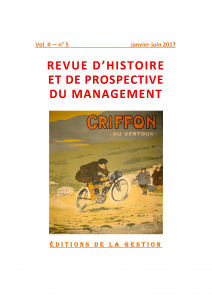Portées par l’économie numérique et l’Internet, de nouvelles pratiques innovantes viennent bousculer les fondements traditionnels de l’innovation. Tout particulièrement, les espaces appelés Fablab (FL) se multiplient aujourd’hui dans le monde entier. Cette vague initiée en 1998 par Neil Gerhenfeld, professeur du MIT, s’est largement diffusée depuis, et a conduit à la constitution d’un maillage de fablabs, que ce soit dans les pays développés ou dans les pays du Sud. Ces espaces collaboratifs (aussi appelés makerspaces), portés par une …[Lire la suite]
Revue d’Histoire et de Prospective du Management n°5
sous la direction de Luc Marco
Working Paper n°2017-17 – Coercive state, resisting society, political and economic development in Iran
Auteurs
Mehrdad Vahabi, CEPN, UMR-CNRS 7234, Université Paris 13, Sorbonne Paris Cité – mehrdad.vahabi@wanadoo.fr
Abstract
In my studies, I have explored the political economy of Iran and particularly the relationship between the state and socio-economic development in this country. The importance of the oil revenue in economic development of contemporary Iran has been underlined since the early seventies and a vast literature on the rentier state and authoritarian modernization has scrutinized the …[Lire la suite]
Working Paper n°2017-16 – Janos Kornai and General Equilibrium Theory
Auteurs
Mehrdad Vahabi, CEPN, UMR-CNRS 7234, Université Paris 13, Sorbonne Paris Cité – mehrdad.vahabi@wanadoo.fr
Abstract
This paper explores the evolution of Kornai’s thought on General Equilibrium Theory (GET) and his position on mainstream economics. Three moments in this evolution will be highlighted starting by rejecting GET and advocating disequilibrium in Anti-Equilibrium (1971). While Kornai does not treat the ‘equilibrium paradigm’ as irrelevant, he suggests an alternative paradigm, namely economic systems theory that …[Lire la suite]
Working Paper n°2017-15 – Remittances and the real effective exchange rates in MENA countries: What is the long run impact?
Auteurs
Mariem Brahim, CEPN, UMR-CNRS 7234, Université Paris 13, Sorbonne Paris Cité – mariouma-brahim@hotmail.fr
Nader Nefzi, CEPN, UMR-CNRS 7234, Université Paris 13, Sorbonne Paris Cité – nefzinader@live.fr
Hamed Sambo, CEPN, UMR-CNRS 7234, Université Paris 13, Sorbonne Paris Cité – hamed.sambo@univ-paris13.fr
Abstract
The aim of this paper is to examine the effect of remittances on real effective exchange rate in MENA countries using an autoregressive distributive lag (ARDL) model …[Lire la suite]
Working Paper n°2017-14 – A critical survey of the resource curse literature through the appropriability lens
Auteurs
Mehrdad Vahabi, CEPN, UMR-CNRS 7234, Université Paris 13, Sorbonne Paris Cité – mehrdad.vahabi@wanadoo.fr
Abstract
There is a vast literature and several surveys on the economic and political resource curse. However, the surveys often fail to capture two points: 1) they disregard the relationship between this recent literature and the staple theory and the staple trap; 2) the appropriability issue has only been treated tangentially and has never been the focus of …[Lire la suite]
Working Paper n°2017-13 – Determinants of technology catch-up in MENA and SSA countries: a panel data analysis
Auteurs
Francisco Serranito, CEPN, UMR-CNRS 7234, Université Paris 13, Sorbonne Paris Cité
serranito@univ-paris13.fr
Abstract
This paper aims at testing the determinants of TFP in the case of a panel of African and Middle-East countries for the period 1970-2010. We get two main results. Firstly, the degree of openness of a country is the only variables that have a positive and robust effect on the TFP growth. Secondly, convergence is not an automatic phenomenon …[Lire la suite]
Working Paper n°2017-05 – Transferts de fonds des migrants vers les pays du Maghreb : quel impact sur le taux de change effectif réel ?
Auteurs
Nader Nefzi, CEPN, UMR-CNRS 7234, Université Paris 13, Sorbonne Paris Cité
nefzinader@live.fr
Joel Oudinet, CEPN, UMR-CNRS 7234, Université Paris 13, Sorbonne Paris Cité
joel.oudinet@univ-paris13.fr
Mouez Soussi, PS2D, Institut de Hautes Etudes Commerciales Carthage
mouez.soussi@hotmail.com
Abstract
L’impact des transferts de fonds sur le taux de change effectif réel est analysé pour un panel de trois pays du Maghreb, la Tunisie, le Maroc et l’Algérie entre 1980 et 2015, à l’aide d’un modèle …[Lire la suite]
